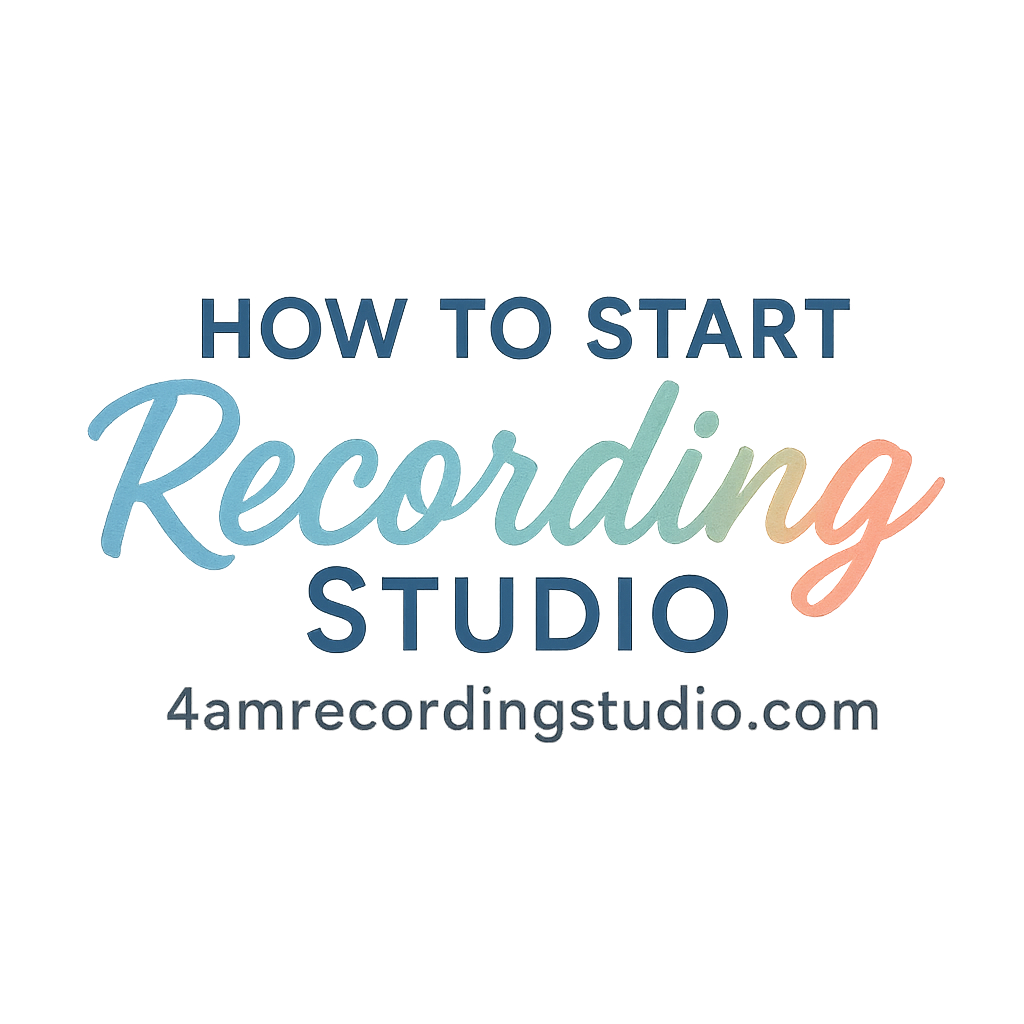Introduction
So you’re finally ready to turn your dream of owning a recording studio into reality. That’s exciting—and slightly terrifying, right? Whether you’re starting in a spare bedroom or leasing a space downtown, building a studio is a big step that requires more than just passion for music.
But here’s the thing: too many beginners fall into the same traps that slow them down or even shut them down completely. Don’t worry, though. I’ve got your back. Let’s break down the five most common mistakes to avoid when starting a recording studio—plus some tips and resources to help you succeed.
Mistake #1: Skipping the Business Plan
Why Planning Is Everything
Starting a recording studio without a business plan is like trying to record a song without a mic. You might have talent, but you’re not setting yourself up for success.
Your business plan should answer critical questions:
- Who is your target market?
- How will you make money?
- What services will you offer?
- What are your startup costs and expected earnings?
A proper recording studio business plan lays the foundation for sustainability and scalability. Don’t wing it—plan it.
How to Start Right
Start with a simple document. Outline your goals, expected income, expenses, and marketing strategies. Not sure where to begin? Visit this guide on how to start a recording studio.
Mistake #2: Buying Too Much Gear Upfront
The Trap of Gear Lust
Ah yes, gear lust. We’ve all been there—drooling over MIDI controllers, compressors, and vintage synths. But blowing your budget on top-tier gear before booking your first client is a rookie mistake.
Sure, having high-end gear feels professional, but what you really need at the beginning is gear that’s:
- Functional
- Scalable
- Budget-friendly
Start Simple and Scale Smart
Start with the essentials—like what’s listed in this guide to recording studio equipment and tools. Build your rig over time as your income grows. Remember, creativity beats gear every time.
Mistake #3: Poor Studio Setup and Acoustics
Don’t Just Rely on Aesthetics
Too many new studio owners focus on how cool the studio looks rather than how well it sounds. A visually stunning space with bad acoustics is like a beautiful car with no engine.
Basics of Good Acoustic Treatment
You don’t need to break the bank. A few panels of acoustic foam, some bass traps in the corners, and a rug can do wonders.
Also, proper studio setup basics include smart monitor placement and treating first reflection points. You want a clean, accurate sound—not just booming bass.
Links to Studio Setup Resources
Explore our Beginner Setup Guides and tips for treating your room acoustically under the Studio Setup Basics section.

Mistake #4: Ignoring Branding and Marketing
Why Branding Is More Than Just a Logo
Your studio’s brand is its identity. It’s how people remember you. Skipping this step can leave you invisible in a competitive space. Branding includes:
- Your studio name and logo
- Your website and socials
- The experience clients have when working with you
Make your brand memorable and relatable. Start by exploring recording studio marketing and branding.
Marketing on a Budget
You don’t need a huge marketing budget. Use:
- Instagram reels showing behind-the-scenes
- Email newsletters (see: Email Marketing)
- Google My Business
- Collaboration with local artists
Leverage hashtags like #marketing and #network to stay visible.
Mistake #5: Neglecting Time and Client Management
Time Is Money – Literally
One of the most overlooked parts of running a studio? Time management. Between bookings, edits, and networking, things get chaotic fast.
Avoid double bookings, burnout, and upset clients by keeping a strict schedule.
Tools to Streamline Scheduling
Use tools like Calendly or Studio Management software to automate your bookings and payments. Learn more about optimizing studio processes from recording studio management and growth tips.
Also, explore tags like #scheduling and #management for more productivity hacks.
Bonus Tips for Beginners
Build Relationships Before Gear Lists
Before you even think about upgrading your gear, build a network of artists, producers, and fellow engineers. People bring business—not just plugins. Check out our collaboration tag to see how working with others can boost your studio faster than any gear.
Be a Student of the Industry
Never stop learning. Subscribe to audio engineering newsletters, join Facebook groups, and listen to podcasts. Keep up with music business trends and experiment constantly.
Final Thoughts
Launching a recording studio is a journey—one that blends creativity, business, and persistence. Avoiding these five common mistakes will give you a head start over most beginners. Focus on value over vanity, and remember: your studio is only as good as the experience you create for others.
Whether you’re just starting or looking to improve, tap into resources like 4AM Recording Studio to keep learning and growing.
FAQs
1. What’s the minimum budget I need to start a recording studio?
You can start with as little as $1,000–$5,000 for a basic home studio. Focus on essential gear first.
2. Do I need a separate room for a recording studio?
Not necessarily. A treated corner of your room can work if you’re on a tight budget.
3. How can I get clients when I’m just starting out?
Offer free sessions to local artists in exchange for testimonials and social media shout-outs. Build relationships before profits.
4. What’s the best DAW for beginners?
Many start with FL Studio, Logic Pro X, or Ableton Live. The best DAW is the one you feel most comfortable using.
5. How important is acoustic treatment really?
Very. Even $100 worth of foam panels and a rug can drastically improve your sound quality.
6. Do I need a business license for my home studio?
In most places, yes. Check your local business regulations to avoid fines or legal issues.
7. What’s the biggest mistake new studio owners make?
Trying to impress with gear instead of focusing on client experience, room acoustics, and consistent branding.
